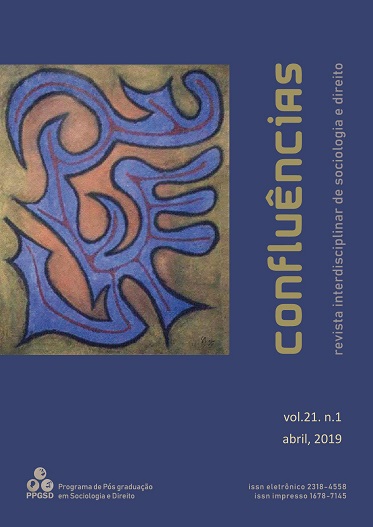BLOOD TRAIL – human rights and the abolition of the death penalty
DOI:
https://doi.org/10.22409/conflu21i1.p560Keywords:
Death Penalty, Human Rights, International Law, Democracy.Abstract
As a direct response to atrocities incurred during World War II, international law has absorbed a number of restrictions against the death penalty by demanding its abolition or setting limits for its application. The abolition movement of the death penalty gains concomitant musculature with the rooting of democracy around the world, and the decade of 1990 can be considered the great culmination of this process. At this point the objective of this work is to illustrate the evolution of the death penalty as an instrument of political pressure and criminal punishment and the subsequent evolution of human instruments that aims not only to put limits on the application of capital punishment but also to the abolition of this punishment.
Downloads
References
BAKKEN, Børge. Crime and the Chinese dream. Hong Kong University Press, HKU, 2018.
BESSLER, John D. The Concept of “Unusual Punishments” in Anglo-American Law: The Death Penalty as Arbitrary, Discriminatory, and Cruel and Unusual. Northwestern Jo-urnal of Law & Social Policy, v. 13, n. 4, p. 307, 2018.
BESSLER, John. The death penalty as torture: from the dark ages to abolition. Carolina Academic Press, 2017.
BROMBERG, Howard. Pope John Paul II, Vatican II, and Capital Punishment. Ave Maria L. Rev., v. 6, p. 109, 2007.
BRUGGER, E. Christian. Capital punishment and Roman Catholic moral tradition. University of Notre Dame Press, 2014.
COSTANZO, Mark. Just revenge: Costs and consequences of the death penalty. Macmillan, 1997.
DOUGLAS, Davison M. God and the Executioner: The Influence of Western Religion on the Use of the Death Penalty. William & Mary Bill of Rights Journal, v. 9, n. 1, p. 137, 2000.
DRASS, Kriss A.; MIETHE, Terrance D. Qualitative comparative analysis and the study of crime events. The process and structure of crime: Criminal events and crime analysis, v. 9, p. 125, 2001.
FUTAMURA, Madoka; BERNAZ, Nadia. The politics of the death penalty and contexts of transition: Democratization, peacebuilding and transitional justice. In: The Politics of the Death Penalty in Countries in Transition. Routledge, 2013. p. 25-40.
GUTMANN, Jerg. Pulling Leviathan's Teeth–The Polítical Economy of Death Penalty Abolition. Browser Download This Paper, 2016.
HARRIS, William V. Restraining rage: The ideology of anger control in classical antiquity. Harvard University Press, 2009.
JOHN, Jacintha Maria Victor. The Hangman’s Knot For Drug Crime. Singapore's Death Penalty in a Modern Society: Is it a Violation of the International Human Rights Standards?. Munich: Grin Publishing, 2014. 82 p.
KIM, Dongwook. International non-governmental organizations and the abolition of the death penalty. European Journal of International Relations, v. 22, n. 3, p. 596-621, 2016.
KLEINFELD, Joshua. Two Cultures of Punishment. Stanford Law Review, v. 68, n. 5, 2016.
KYLE, Donald G. Spectacles of death in ancient Rome. Routledge, 2012.
MCGANN, Anthony; SANDHOLTZ, Wayne. Patterns of death penalty abolition, 1960–2005: Domestic and international factors. International Studies Quarterly, v. 56, n. 2, p. 275-289, 2012.
MCRAE, Dave. Indonesian Capital Punishment in Comparative Perspective. Bijdragen tot de taal-, land-en volkenkunde/Journal of the Humanities and Social Sciences of Southeast Asia, v. 173, n. 1, p. 1-22, 2017.
MEGIVERN, James J. Capital Punishment: The Curious History of Its Privileged Place in Christendom. Proceedings of the American Philosophical Society, v. 147, n. 1, p. 3-12, 2003.
MORTENSEN, Anne Katrine. Abolition of the death penalty. An event history analysis of the political, cultural and socioeconomic determinants of death penalty abolition. 2008. Dissertação de Mestrado. The University of Bergen.
NEUMAYER, Eric. Death penalty: The political foundations of the global trend towards abolition. Human Rights Review, v. 9, n. 2, p. 241-268, 2008.
PINTO, Paulo Jorge de Sousa. A Pena de Morte em Portugal e no mundo. Carta de Lei da Abolição da Pena de Morte em Portugal 1867-2017, p. 192-217, 2017.
POTTER, Nelson T. Kant and capital punishment today. The Journal of value inquiry, v. 36, n. 2-3, p. 267-282, 2002.
PROKOSCH, Eric. 2004. ‘The Death Penalty versus Human Rights’. In: Council Of Europe. Death Penalty: Beyond Abolition. Strasbourg: Council of Europe, 2004.
PROKOSCH, Eric. The death penalty versus human rights. COUNCIL OF EUROPE. Death Penalty: Beyond Abolition. Strasbourg: Council of Europe, 2004.
RAMOS, Tainá Corrêa Barbosa. Capital punishment: a theoretical and cooperative analysis. Adam Mickiewicz University Law Review, v. 6, p. 145-156, 2016.
ROESLER, Claudia Rosane. A estabilização do direito canônico e o decreto de Graciano. Seqüência: estudos jurídicos e políticos, v. 25, n. 49, p. 9-32, 2004.
SCHABAS, William A. 1993. The Abolition of the Death Penalty in International Law. Cambridge, England: Grotius Publications.
SUH, Chan S. Democracy and the making of contentious policy: The role of democracy in the abolition of the death penalty, 1950–2010. International Journal of Comparative Sociology, v. 56, n. 5, p. 314-337, 2015.
WILLIAMS, Brackette F. " Reigning" in barbarians: Barbados, abolition activism, and death penalty classification. Revista Brasileira de Ciências Sociais, v. 23, n. 68, p. 23-40, 2008.
WILSON, Richard J. The Death Penalty and Mental Illness in International Human Rights Law: Toward Abolition. Wash. & Lee L. Rev., v. 73, p. 1469, 2016.







